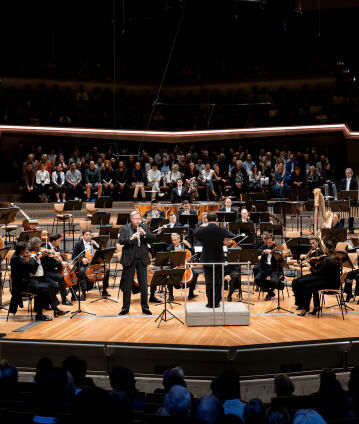Kirill Petrenko conducts Brahms, Zimmermann and Dusapin

Johannes Brahms set new standards with his First Symphony: thanks to its dramatically coloured tonal language, it is regarded as the epitome of the late Romantic symphony – at the same time, its innovative thematic design continues to have an impact into the modern era. Kirill Petrenko and the Berliner Philharmoniker combine the work with Bernd Alois Zimmermann’s expressive Oboe Concerto with Albrecht Mayer as the soloist. The sonorously powerful Exeo by Pascal Dusapin is a discovery.
“I am driven by an inner fire that refuses to compromise when it comes to expression,” says Pascal Dusapin, “but more than anything else, I am searching for new emotions.” The Latin title of his composition Exeo means to exit, depart, escape – perhaps leaving behind the familiar and hackneyed in music? Dusapin, who studied in Paris under Olivier Messiaen and Iannis Xenakis, among others, is now one of the leading French composers of our time. In the fifth part of his seven Solos pour orchestre, he explores the imaginative soundscapes that an orchestra can produce. Rather than dramatically grandiose, the figures here interact subtly – and in their intensity and radicalism, they possess indeed the potential to trigger unusual emotional states. Chief conductor Kirill Petrenko describes the composition as “stupendous and beautiful”. This is the first time that the Berliner Philharmoniker perform a work by Dusapin at the Philharmonie Berlin. In 2007, under the baton of Sir Simon Rattle, they premiered a commissioned composition by the composer at the Festival d’Aix-en-Provence.
The first movement of Bernd Alois Zimmermann’s Concerto for Oboe and Small Orchestra is entitled Hommage à Stravinsky. Zimmermann particularly admired Stravinsky’s “art of omission”, and his Neoclassicism also influenced his style. The serial music techniques of the Darmstadt School and other contemporary groups can also be found in Zimmermann’s work, although he deliberately distanced himself from them. Orchestra member Albrecht Mayer takes centre stage here as the soloist in a highly virtuosic piece that demands an enormous range of playing techniques.
Conductor Hans von Bülow called Brahms’s First Symphony “Beethoven’s Tenth”, and the stylistic similarities are unmistakable – yet it clearly bears Brahms’s unique stamp. Brahms established himself with this work as a worthy successor to Beethoven by respectfully continuing the symphonic tradition while also providing a visionary perspective on the future development of a genre that had been declared dead.
© 2025 Berlin Phil Media GmbH
Related interview
Artists
Our recommendations
- Season opening 2025: Kirill Petrenko conducts Brahms, Zimmermann and Schumann
- François-Xavier Roth and Albrecht Mayer
- Semyon Bychkov conducts Berio and Walton
- Christian Thielemann and Albrecht Mayer with works by Strauss and Bruckner
- Kirill Petrenko conducts Beethoven’s Ninth Symphony at the Brandenburg Gate
- Kirill Petrenko conducts Strauss’s “Elektra” at the Easter Festival in Baden-Baden